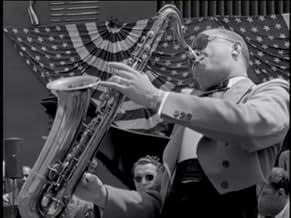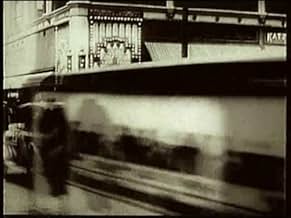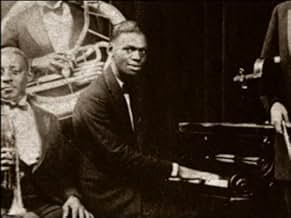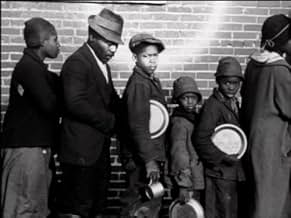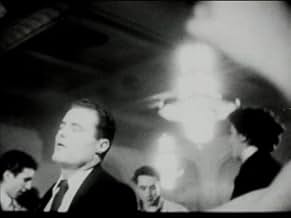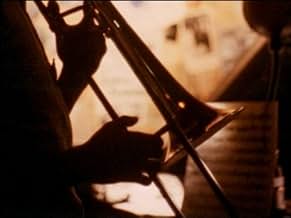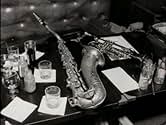Jazz: A Film by Ken Burns
- Mini serie TV
- 2001
- 1h 48min
VALUTAZIONE IMDb
8,6/10
2619
LA TUA VALUTAZIONE
Aggiungi una trama nella tua linguaA survey of the musical form's history and major talents.A survey of the musical form's history and major talents.A survey of the musical form's history and major talents.
- Candidato a 5 Primetime Emmy
- 2 vittorie e 7 candidature totali
Sfoglia gli episodi
Recensioni in evidenza
I enjoyed watching "Jazz" but as the show progressed I enjoyed it less and less. Much of it is because I simply like the older jazz and swing music and didn't enjoy the more modern free-form style of jazz. Much of it is also because the more I watched the show the more I noticed a few biases. EVERY EPISODE MENTIONED LOUIS ARMSTRONG. While he was a jazz great, it was obvious that Ken Burns REALLY adores Louis Armstrong and I wish he'd just made a show about him! He also strongly loves Duke Ellington. But he also inexplicably skips over some jazz or swing musicians who deserved mentioned--in particular Cab Calloway. He only mentions him BRIEFLY twice--and never positively or in any depth at all. The same could be said for Glenn Miller when the shows were about swing--it wasn't very complementary and was VERY brief (never even mentioning his premature death). This makes me wonder about what I watched--was it really the comprehensive history of jazz or just a particular and biased view? Still, despite this, the shows are well made, have some great music and did get me to appreciate and enjoy jazz and especially swing much more than I had. Worth seeing but I really would like to see some alternate view of the history of jazz, as it just felt like I was missing something.
This is a compilation that is pretty much essential for those coming to the music for the first time, and will afford a lot of pleasure to those who have been listening for some time too. Some of the film clips are breathtaking: you ask yourself 'where did he find that?' The focus is on the great figures of Armstrong, Ellington, Parker and Billie Holiday, which is appropriate since these people did more than others to shape the course of the music over the last century, but many viewers will be frustrated by the glancing attention and even omission given to some musicians. Why was it not thought necessary to show 'Lockjaw' Davis, Johnny Griffin, Tadd Dameron, Red Garland, Art Pepper, Lee Konitz, Jo Stafford and many more? Chick Corea and Keith Jarrett, where are they? It seems as though Winton Marsalis decided who the great ones were, and the worthy ones could be ignored.
I will praise the editors who took this huge mass of material and made something coherent and entertaining out of it. We must forever be in their debt. The way is now clear for some documentarist to make a series on jazz from 1960 to today.
I will praise the editors who took this huge mass of material and made something coherent and entertaining out of it. We must forever be in their debt. The way is now clear for some documentarist to make a series on jazz from 1960 to today.
Ken Burns' Jazz documentary, which is a twenty-hour documentary (too long or not long enough would be the argument, I'd go with not long enough), details the history of Jazz from its origins in Ragtime, up until the 1960's. It is indeed insightful for those who do not know the histories of these people, pretty much all of them terrific or outstanding, and it does try to take you inside their world. As one who has only really gotten into Jazz within the past few years, as just a history lesson it keeps attention most of the way through.
The problems one can find in the documentary could be really squared down to two. The first is that Burns, while talented and obviously with a good research team and plethora of pictorial aids, forgets something about Jazz- it's supposed to be fun! There's something about the sense of humor and vitality of jazz that gets lost among the heavy-handed narrations, that make jazz out to be as mighty and colossal as the Greeks or the Romans. Jazz is important to the world of music, but much of what is spoken trumps most of the experiences in the stories (not that a few of them aren't entertaining- most of the stuff involving Armstrong, Bix, Blaisie, and Art Tatum keeps interest that way). The second problem, which is a given considering the length of the documentary, is that there isn't enough room for everyone, and after Miles and Coltrane, it just halts. It would be intriguing if Burns went back and did a 'special edition' treatment, and cover more ground on what he had, and expand into the great jazz that did come out since the 60's (and there has been a few, believe you/me).
If you're wanting to get into the atmosphere, the moods and histories (and of course the music, some of it rare here) on Jazz, basically this is the best place to start. But if you're already an aficionado, or if you don't have the utmost attention span to watch all of the footage, it may comes to let-down.
The problems one can find in the documentary could be really squared down to two. The first is that Burns, while talented and obviously with a good research team and plethora of pictorial aids, forgets something about Jazz- it's supposed to be fun! There's something about the sense of humor and vitality of jazz that gets lost among the heavy-handed narrations, that make jazz out to be as mighty and colossal as the Greeks or the Romans. Jazz is important to the world of music, but much of what is spoken trumps most of the experiences in the stories (not that a few of them aren't entertaining- most of the stuff involving Armstrong, Bix, Blaisie, and Art Tatum keeps interest that way). The second problem, which is a given considering the length of the documentary, is that there isn't enough room for everyone, and after Miles and Coltrane, it just halts. It would be intriguing if Burns went back and did a 'special edition' treatment, and cover more ground on what he had, and expand into the great jazz that did come out since the 60's (and there has been a few, believe you/me).
If you're wanting to get into the atmosphere, the moods and histories (and of course the music, some of it rare here) on Jazz, basically this is the best place to start. But if you're already an aficionado, or if you don't have the utmost attention span to watch all of the footage, it may comes to let-down.
It's very sad to read how many people were bowled over by this so-called documentary. Sadder yet to see how many were coerced into thinking that this was a legitimate history of jazz. Let us look at some facts:
Before beginning this project, Ken Burns had in his own words, "maybe two" jazz cds. Because of this, he looked toward Wynton Marsalis for guidance. As a result, the entire documentary was slanted in accordance with Wynton's beliefs--the strongest belief being that white people have nothing to contribute to the genre.
This in mind, it is obvious that taking all of one's cues from him is a rather large mistake, as evidenced in Ken's show. For example, the entire West Coast movement was written off. There is no mention of Stan Kenton, Woody Herman, and many of the other great artists and innovators, simply because they were the wrong color...white. In addition, the trombone is not considered to be relevant past the big band era (Sorry J.J. Johnson!! Sorry Kai Winding!). Then of course, there is the statement made that no worthwhile jazz was composed after (approximately) 1965...well...until WYNTON MARSALIS came along!! What a slap in the face!! This is just the tip of the iceberg.
Yes, there were some good things in the show. The old footage of the great ones: Armstrong, Ellington, Basie, etc. It's too bad that Burns neglected to interview many of the musicians who are still alive that played in these organizations. Clark Terry, one of the finest trumpet players to ever walk the earth, and who played in BOTH Ellington and Basie's bands, ended up having less than 2 minutes, speaking about things that were relatively trite.
The main message that permeated this series was this: Black people created jazz, and whites made only minor contributions. Wynton has stated before that there is nothing that a white person could teach him about jazz. This means in Wytnon's mind that Django, Kenton, Bill Evans, Bix, Brubeck, Chet Baker, Gerry Mulligan, Jack Teagarden, Kai Winding, etc., etc., etc...have nothing to contribute, because they're white. Sad, isn't it?
Hopefully, someday Wynton and Burns will see that two wrongs don't make a right. Until then, if you want a true history of jazz, pick up a book called "Meet me at Jim and Andy's" by Gene Lees.
Before beginning this project, Ken Burns had in his own words, "maybe two" jazz cds. Because of this, he looked toward Wynton Marsalis for guidance. As a result, the entire documentary was slanted in accordance with Wynton's beliefs--the strongest belief being that white people have nothing to contribute to the genre.
This in mind, it is obvious that taking all of one's cues from him is a rather large mistake, as evidenced in Ken's show. For example, the entire West Coast movement was written off. There is no mention of Stan Kenton, Woody Herman, and many of the other great artists and innovators, simply because they were the wrong color...white. In addition, the trombone is not considered to be relevant past the big band era (Sorry J.J. Johnson!! Sorry Kai Winding!). Then of course, there is the statement made that no worthwhile jazz was composed after (approximately) 1965...well...until WYNTON MARSALIS came along!! What a slap in the face!! This is just the tip of the iceberg.
Yes, there were some good things in the show. The old footage of the great ones: Armstrong, Ellington, Basie, etc. It's too bad that Burns neglected to interview many of the musicians who are still alive that played in these organizations. Clark Terry, one of the finest trumpet players to ever walk the earth, and who played in BOTH Ellington and Basie's bands, ended up having less than 2 minutes, speaking about things that were relatively trite.
The main message that permeated this series was this: Black people created jazz, and whites made only minor contributions. Wynton has stated before that there is nothing that a white person could teach him about jazz. This means in Wytnon's mind that Django, Kenton, Bill Evans, Bix, Brubeck, Chet Baker, Gerry Mulligan, Jack Teagarden, Kai Winding, etc., etc., etc...have nothing to contribute, because they're white. Sad, isn't it?
Hopefully, someday Wynton and Burns will see that two wrongs don't make a right. Until then, if you want a true history of jazz, pick up a book called "Meet me at Jim and Andy's" by Gene Lees.
I am neither a musician nor a serious scholar of jazz, just a fan,but even I could see the flaws in Ken Burns' sometimes fascinating, other times infuriating documentary on the history of "America's music".
Spanning the century, this nineteen hour documentary is most effective at the beginning, when Burns' gift for research is most apparent. You can see the pains he took searching documentation and rare photographs to paint a picture of the roots of the music. However, as the narrative moves on, his over-reliance for third and fourth hand accounts and his own ignorance of the genre becomes apparent.
I am not going to go into the laundry list of "should have" musicians (Lionel Hampton, Stan Getz, JJ Johnson, Charles Mingus gets only ten minutes!) and others that got short shrift or weren't even mentioned. I'd be here all day.
However, I will say that Burns obviously relied too much on critics and writers in putting together his material. Towards the end, especially when they begin to talk of the 50's and 60's, the whole program begins to have the taint of academia all over it.
For example, the 50s phenomenon of the wildly popular California-based "cool jazz" is dismissed by critic Nat Hentoff as "bland" and then never mentioned again.
I am sorry to disagree with the distinguished Mr. Hentoff, but as anyone who has heard the recordings of such greats as Gerry Mulligan and Chet Baker can atest, the music they were producing was just as creative and exciting as their East Coast, black contemporaries.
To people like Mr. Hentoff, the west coast musicians committed the ultimate sin of being white and somewhat popular. Much of the documentary continues along the same "us vs. them" vein.
It seems the people who assisted Mr. Burns took advantage of his ignorance and stamped their orthodox biases on what could have been a great work. Whole genres and types (fusion, Cubano, Brazillian) are either dismissed outright or ignored. It reinforces my view that critics are the most useless species on the face of the planet.
However, I do have to admit that many parts were fascinating. When Burns does interview eyewitnesses to certain events, it shows the flashes of "what might have been". I just wish that he wouldn't have blindly followed the opinions of the the critics and academics and let the audience discover for themselves what to think.
Spanning the century, this nineteen hour documentary is most effective at the beginning, when Burns' gift for research is most apparent. You can see the pains he took searching documentation and rare photographs to paint a picture of the roots of the music. However, as the narrative moves on, his over-reliance for third and fourth hand accounts and his own ignorance of the genre becomes apparent.
I am not going to go into the laundry list of "should have" musicians (Lionel Hampton, Stan Getz, JJ Johnson, Charles Mingus gets only ten minutes!) and others that got short shrift or weren't even mentioned. I'd be here all day.
However, I will say that Burns obviously relied too much on critics and writers in putting together his material. Towards the end, especially when they begin to talk of the 50's and 60's, the whole program begins to have the taint of academia all over it.
For example, the 50s phenomenon of the wildly popular California-based "cool jazz" is dismissed by critic Nat Hentoff as "bland" and then never mentioned again.
I am sorry to disagree with the distinguished Mr. Hentoff, but as anyone who has heard the recordings of such greats as Gerry Mulligan and Chet Baker can atest, the music they were producing was just as creative and exciting as their East Coast, black contemporaries.
To people like Mr. Hentoff, the west coast musicians committed the ultimate sin of being white and somewhat popular. Much of the documentary continues along the same "us vs. them" vein.
It seems the people who assisted Mr. Burns took advantage of his ignorance and stamped their orthodox biases on what could have been a great work. Whole genres and types (fusion, Cubano, Brazillian) are either dismissed outright or ignored. It reinforces my view that critics are the most useless species on the face of the planet.
However, I do have to admit that many parts were fascinating. When Burns does interview eyewitnesses to certain events, it shows the flashes of "what might have been". I just wish that he wouldn't have blindly followed the opinions of the the critics and academics and let the audience discover for themselves what to think.
Lo sapevi?
- ConnessioniFeatured in WatchMojo: Top 10 Documentary Mini Series (2015)
I più visti
Accedi per valutare e creare un elenco di titoli salvati per ottenere consigli personalizzati
- How many seasons does Jazz have?Powered by Alexa
Dettagli
- Tempo di esecuzione1 ora 48 minuti
- Colore
- Mix di suoni
- Proporzioni
- 1.33 : 1
Contribuisci a questa pagina
Suggerisci una modifica o aggiungi i contenuti mancanti

Divario superiore
By what name was Jazz: A Film by Ken Burns (2001) officially released in Canada in English?
Rispondi

